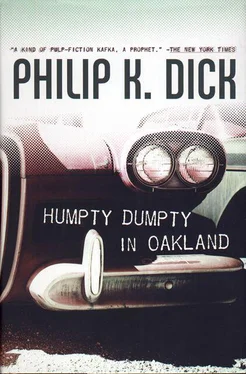Should he follow her? He did not feel much like seeing the old man again. But on the other hand, it was his job to discuss the thing, not his wife’s. So he followed along, knowing that her quick, long-legged stride would get her inside well before him. And sure enough, when he entered the garage, and his eyes had had time to adjust to the dim light, he found her standing with the old man, in conversation.
Neither paid him any attention as he came slowly up.
Speaking in his usual hoarse, low voice, the old man was explaining what he had explained to Al; he went over the same ground, in almost the same words. As if, Al thought, it was a set speech he had put together. The old man told her that the choice was not his, as she well knew, because his doctor had told him he could no longer do the heavy kind of work that auto-repairing entailed, and so forth. Al listened without interest, standing so that he could look outside, at the bright midday street and the cars and people going by.
“Well, I’ll tell you what I think,” Julie said in her brisk voice. “This might turn out to be a good thing because possibly now he can go back to school.”
At that, Al said, “Christ.”
The old man regarded him, rubbing his right eye, which had become red and swollen; it had something in it, evidendy. Reaching into his hip pocket he brought out a large handkerchief and began touching the corner of it to his eye. He regarded both Al and Julie with what seemed to Al to be cunning and nervousness mixed together. The old man had made up his mind; he had decided on his position, not only regarding his garage, but regarding the two of them. Whether he felt he had done right or not by them did not matter. He would not budge. Al knew him well enough to know that; the old man was too stubborn. Even Julie, with her authoritative tongue, couldn’t affect him.
“I tell you,” the old man mumbled. “It’s a lousy life, working in this damp drafty place. It’s a wonder I didn’t die years ago. I’ll be glad to get out of here; I deserve a vacation.”
Julie said, her arms folded, “You could have included a stipulation in the sale that the new owner had to continue the lease of the lot to my husband for the same figure.”
Ducking his head, the old man said, “Well, I don’t know. That’s up to my broker; I let him handle all that.”
His wife’s face had become red. Al had rarely seen her as angry as this; her hands were shaking, and that was why she had folded her arms. She was hiding her hands. “Listen,” she said in a high-pitched voice. “Why don’t you just die and will the garage to Al? I mean, you don’t have any children, any family.” She was silent then. As if, Al thought, she knew she had said something bad. And it was bad, he thought. It was unfair. The garage was the old man’s. But of course Julie would never admit that; she would not be bound by facts.
“Come on,” Al said to her. Taking hold of her arm he forcibly moved her away from the old man, who was mumbling something in answer, toward the entrance and the street.
“It makes me so furious,” she said, as they came out into the sunlight. “He’s really senile.”
“Senile, hell,” Al said. “He’s a smart old man.”
“Like an animal,” she said. “Without regard to others.”
“He’s done a lot for me,” he said.
“If you sold all the cars on the lot,” she said, “how much would you get?”
“About five hundred bucks,” he said. But it would be a little more than that.
“I can go back on full time,” she said.
Al said, “I’ll shop around for another location.”
“You told me you couldn’t do it without his help,” she said. “You said you don’t have enough capital to buy cars that you can put up for sale without—”
“I’ll make a deal with another garage,” Al said.
Julie said, “This is the time for you to go back to school.” She halted and faced him firmly.
In her mind, he needed a college degree. He needed to go three more years—he had gone to the University of California for one year—and then he would be able to get what she called a good job. His degree would be in a practical subject; business administration had been her choice. In his one year he had had no major. He had taken only a general course, a little of this and that. It had not appealed to him and so he had not gone back.
For one thing, he did not like to be indoors. Perhaps that was why the used-car business attracted him; he could be outside all day long, in the sun. And of course he was his own boss. He could come and go as he pleased; he could open the lot at eight or nine or ten, go to lunch at one or two or three. Stay half an hour, or a whole hour, or even eat his lunch in one of the cars.
He had built a little building in the center of the lot, out of basalt blocks. It had aluminum window units which he had picked up wholesale; in fact, the wiring, too, had come wholesale, and the roofing, as well as the fixtures. It was almost a house, and he thought of it as such, a house he had built with his own hands, which belonged to him, in which he could go whenever he wanted and stay, out of sight, as long as he wanted. In it he had an electric heater, a desk, a file cabinet; he had magazines to read, and his business papers. Sometimes he had a typewriter which he rented at five dollars a month. Formerly he had had a phone, but that was gone for good.
If he moved, if he gave up the lot, he would take the house with him. It belonged to him; it was his personal property, as were the cars. Unlike the cars, it was not for sale. One other object which was not for sale and which belonged to him would go along, too. Like the house, he had built it. In the rear of the lot, out of sight, he had a car he had been working on for months. When he had any spare time he turned to it.
The car was a 1932 Marmon. It had sixteen cylinders and it weighed over five thousand pounds. In the days when it had been in running condition it had gone up to a hundred and seven miles an hour. It had been, in fact, one of the finest autos in the United States, and it had originally cost five thousand five hundred dollars.
A year ago, Al had come across the old Marmon in a shed. Its condition was deplorable, and he had, after several weeks of haggling, been able to pick up the car for one hundred and fifty dollars, including two extra tires. From what he knew about cars, he believed that when it was fully restored, the Marmon would be worth between two thousand five hundred and three thousand dollars. So, at the time, it had seemed to be a good investment. But for the past year he had been at work on the task of restoration, and it was by no means finished.
One afternoon, while he had been working on the Marmon, he had looked up to see two colored men standing watching him. A good deal of the sidewalk traffic on the street was colored, and he sold as many cars to Negroes as to whites.
“Hi,” he said.
One of the Negroes nodded.
“What that?” the other asked.
Al said, “A 1932 Marmon.”
“Man,” the taller of the two Negroes said. Both men were young. They wore sports coats and white shirts, without ties, and dark slacks. Both seemed well-groomed. One smoked a cigarette, the taller one who had spoken. “Listen,” he said. “Maybe I bring my father to look at that. He like something like that to drive him in, when he got to go to visit in Florida.”
The other Negro said, “Yeh, he old dad like to ride in a car like that. We go get him; you see.”
Getting to his feet, Al said, “This is a collectors car.” He then tried to explain to them that the car was not for sale; at least, not in the terms that they would understand. This was not transportation, he explained. This was a treasured heritage from the past, one of the superb old touring cars; in some ways, the finest of them all. And, as he talked, he saw that as a matter of fact they did understand; they understood perfectly. It was just what the taller Negro’s old dad wanted to ride to Florida in. And, thinking about it, Al could see their point. It was just that this car was almost thirty years old, and not in running condition. It had not run in fact since before World War Two.
Читать дальше










